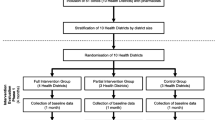Abstract
A survey regarding the management of rational pharmacotherapy was conducted among all Dutch general hospitals in 1998. The response was 99% (n = 120). The presence of a drugs and therapeutics committee and antibiotic policies in Dutch general hospitals appears independent of hospital characteristics. However, formulary agreements and treatment guidelines are less likely to be present in hospitals that employ only 1 pharmacist or those served by community pharmacies. More than half of the hospitals claim to have restrictive formulary agreements. Large hospitals, hospitals in the eastern and southern provinces and those served by hospital pharmacies more often tend to have restrictive agreements compared to small hospitals, hospitals in the northern, central, and western provinces, and those served by community pharmacies. Various methods to impose restriction and ensure formulary compliance are mentioned. It must be noted that hospitals tend to operate rather solely regarding the large number of different formularies. Surprisingly just a small majority of pharmacists evaluates formulary agreements positively as a management tool. Many drawbacks appear to be present. The results of this survey indicate that in the future Dutch hospitals will favour disease management (treatment guidelines) over drug management (formulary agreements) in the management of rational pharmacotherapy and that information technology will be used to influence clinicians' prescribing behaviour.
Similar content being viewed by others
References
Bochner F, Burgess N, Dean Martin E. Approaches to rationing drugs in hospitals. An Australian perspective. Pharmacoeconomics 1996;10:467-74.
Bochner F, Martin E, Burgess N, Somogyi A, Misan G. Controversies in Treatment. How can hospitals ration drugs? BMJ 1994;308:901-8.
Thürmann P, Harder S, Steioff A. Structure and activities of hospital drug committees in Germany. Eur J Clin Pharmacol 1997;52:429-35.
Rascati K. Survey of formulary system policies and procedures. Am J Hosp Pharm 1992;49:100-3.
Hogerzeil H. Promoting rational prescribing: an international perspective. Br J Clin Pharmacol 1995;39:1-6.
Sloan F, Gordon G, Cocks D. Hospital drug formularies and use of hospital services. Med Care 1993;31:851-67.
Hepler C. Where is the evidence for formulary effectiveness? Am J Health Syst Pharm 1997;54:95
Horn S. Unintended consequences of drug formularies. Am J Health Syst Pharm 1996;53:2204-6.
Dutch Care Federation. List of Addresses 1997.
Royal Dutch Society for the Advancement of Pharmacy. List of Addresses 1997.
Dutch Association of Clinical Pharmacology. List of Addresses 1997.
Dutch Association of Hospital Pharmacists. Tasks and functions of the hospital pharmacy (Dutch) 1980.
Rucker T, Schiff G. Drug formularies: myths-in-formation. Med Care 1990;28:928-42.
Rights and permissions
About this article
Cite this article
Fijn, R., de Jong‐van den Berg, L. & Brouwers, J. Rational pharmacotherapy in The Netherlands: formulary management in Dutch hospitals. Pharm World Sci 21, 74–79 (1999). https://doi.org/10.1023/A:1008654609916
Issue Date:
DOI: https://doi.org/10.1023/A:1008654609916




